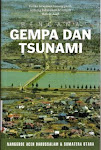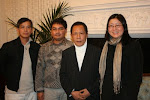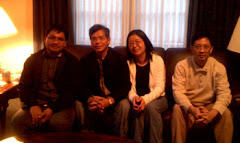
With Open Hands,
by Henri Nouwen
Chapter 1: Prayer & Silence
We know there is some connection between prayer and silence, but if we think about silence in our life it seems that it isn’t always peaceful; silence can also be frightening.
One student who had thought deeply about the silence in his life wrote:
Silence is night
and just as there are nights
with no moon and no stars
when you’re all alone
totally alone
when you’re cursed
when you become a nothing
which no one needs —
so there are silences
which are threatening
because there is nothing except
the silence.
Even if you open your ears
and your eyes
it keeps going on
without hope or relief.
Night with no light, no hope
I am alone
in my guilt
without forgiveness
without love.
Then, desperately, I go looking
for friends
then I walk the streets
a body
a sign
a sound
for nothing.
But the are also nights
with stars
with a full moon
with the light from a house
in the distance
and silences which are peaceful
and reflective
the noise of a sparrow
in a large empty church
when my heart wants to sing out
with joy
when I feel that I’m not alone
when I’m expecting
friends
or remember
a couple of words
from a poem I read lately
when I lose myself in a
Hail Mary
or the somber voice of a psalm
when I am me
and you are you
when we aren’t afraid of
each other
when we leave all talk to
the angel
who brought us the silence
and peace.
Just as there are two nights, there are two silences, one is frightening and the other is peaceful. For many, silence is threatening. They don’t know what to do with it. If they leave the noise of the city behind and come upon a place where no cars are roaring, no ships are tooting, no trains rumbling, where there is no hum of radio or television, where no records or tapes are playing, they feel their entire body gripped by an intense unrest. They feel like a fish which has been set on dry land. They have lost their bearings. There are some students who can’t study without a solid wall of music surrounding them. If they are forced to sit in a room without the constant flow of sound, they grow very nervous.
Thus, for many of us, silence has become a real disturbance. There was a time when silence was normal and a lot of racket disturbed us. But today, noise is the normal fare, and silence, strange as it may seem, has become the real disturbance. It is not hard to understand, therefore, that people who experience silence in this way will have difficulty with prayer.
We have become alienated from silence. If we go to the beach, or on a picnic in the woods, the transistor radio is often our most important companion. Perhaps we should say that we can’t stand the sound of silence.
Silence is full of noise. The wind murmuring, the leaves rustling, the birds flapping their wings, the waves washing ashore. And even if these noises cannot be heard, there is still the breathing of a quiet man, the motion of his hand over his skin, the swallowing of his throat, and the soft patter of footfalls. But we have become deaf to this thundering silence. It seems that it can’t be heard anymore without the help of amplifiers.
If a person is invited to exchange this noise for silence, it is often a frightening proposal. He feels like a child who sees the walls of a house collapse and suddenly finds himself in an open field, or like a woman who is violently stripped of her clothing, or like a bird town away from its nest. His ears begin to ache because the familiar sounds are missing and his body needs that noise as a downy blanket which kept it warm. The man who is thus sent into silence is like the dope addict who must go through the painful withdrawal process.
But still more difficult than getting rid of that surrounding din is the achievement of inner silence, a silence of the heart which goes beyond every man. It seems that a person who is caught up in all that noise has lost touch with his own inner self. The questions which are asked from within go unanswered. The unsure feelings are not cleared up and the tangled desires are not straightened out, the confusing emotions are not understood. All that remains is a chaotic tumble of feelings which have never had a chance to be cured because the man constantly let himself be distracted by a world demanding all his attention.
It is hardly a surprise, therefore, that when all the daily racket is shut off, a new noise turns on, rising out of all those vague feelings which scream for attention. The person who enters a quiet room still doesn’t experience inner silence. When there is no one to talk to, and no one to listen to, an interior discussions starts up which almost seems to get out of hand. The many unsolved problems demand attention, one care forces itself upon the other, one complaint rivals the next, all plead for a hearing. Sometimes a person is left powerless in the face of twisted sentiments which he cannot untangle.
It makes you wonder if the diversion we look for in the many things outside us might not be an attempt to avoid a confrontation with what is inside. "What should I begin when I’m through with all my work?" This question leads many people to flee from themselves and to hold fast to any number of things which make them feel like they’re still busy. It’s as if they were saying: "Where do I turn when I have no more friends to talk with, no music to listen to, no paper to read, and no films to see?" The problem here is not whether a person can live without friends or without feeding his eyes and ears, but that there are many people who can’t stand to be alone, to shut their eyes, to gently push aside all the assorted noises and to sit calmly and quietly.
To be calm and quiet all by yourself is hardly the same as sleeping. In fact, it means being fully awake and following with close attention every move going on inside you. It involves a self-discipline where the urge to get up and go is recognized as a temptation to look elsewhere for what is really close at hand. It is the freedom to stroll in your own yard, to rake up the leaves and clear the paths so you can easily find you way. Perhaps there will be much fear and uncertainty when we first come upon this "unfamiliar terrain," but slowly and surely we begin to see developing an order and a familiarity which summon our longing to stay home.
With this new confidence, we recapture our own life afresh from within. Along with the new knowledge of our "inner space" where feelings of love and hate, tenderness and pain, forgiveness and greed are separated, strengthened or reformed, there emerges the mastery of the gentle hand. This is the hand of the gardener who carefully makes space for a new plant to grow, and who doesn’t pull weeds too rashly, but only uproots those which threaten to choke the young life. Under his gentle regime, a man once again becomes master over his own house. Not only over his day, but over his night as well. Not only when he is awake, but also when he sleeps. For he who has the day, will gain the night as well. Sleep is no longer a strange darkness, but a friendly curtain behind which dreams continue to live and to send out messages which can be gratefully received. The paths of his dreams are as trusty as the paths of his waking hours and there is no longer any need to be afraid.
If we do not shun the silence, all this is possible. But it is not easy. Noise from the outside keeps demanding our attention, and restlessness from within keeps stirring up our anxiety. Many people feel trapped between this temptation and this fear. Since they can’t turn inward, they look for calm in the noises, even when they know they will never find it there.
But whenever you do come upon this silence, it seems as though you have received a gift, one which is "promising" in the true sense of the word. The promise of this silence is that new life can be born. It is this silence which is the silence of peace and prayer, because you are brought back to the other who is leading you. In this silence you lose the feeling of being compulsive and you find yourself a person who can be himself along with other things and other people.
Then you realize that you can do many things, but it isn’t necessary. It is the silence of the "poor in spirit," where you learn to see your life in its proper perspectives. In this silence, the false pretenses fade away and you can see the world again with a certain distance, and in the midst of all your cares, you can pray with the psalmist:
If Yahweh does not build the house,
in vain the masons toil;
if Yahweh does not guard the city,
in vain the sentries watch.
(Psalm 127)
What We Feel Is Not Who We Are
Our emotional lives move up and down constantly. Sometimes we experience great mood: swings from excitement to depression, from joy to sorrow, from inner harmony to inner chaos. A little event, a word from someone, a disappointment in work, many things can trigger such mood swings. Mostly we have little control over these changes. It seems that they happen to us rather than being created by us.
Thus it is important to know that our emotional life is not the same as our spiritual life. Our spiritual life is the life of the Spirit of God within us. As we feel our emotions shift we must connect our spirits with the Spirit of God and remind ourselves that what we feel is not who we are. We are and remain, whatever our moods, God's beloved children.
But God's forgiveness is unconditional; it comes from a heart that does not demand anything for itself, a heart that is completely empty of self-seeking. It is this divine forgiveness that I have to practice in my daily life. It calls me to keep stepping over all my arguments that say forgiveness is unwise, unhealthy, and impractical. It challenges me to step over all my needs for gratitude and compliments. Finally, it demands of me that I step over that wounded part of my heart that feels hurt and wronged and that wants to stay in control and put a few conditions between me and the one whom I am asked to forgive. [Henri Nouwen quoted by Yancey p.82]
.




















No comments:
Post a Comment